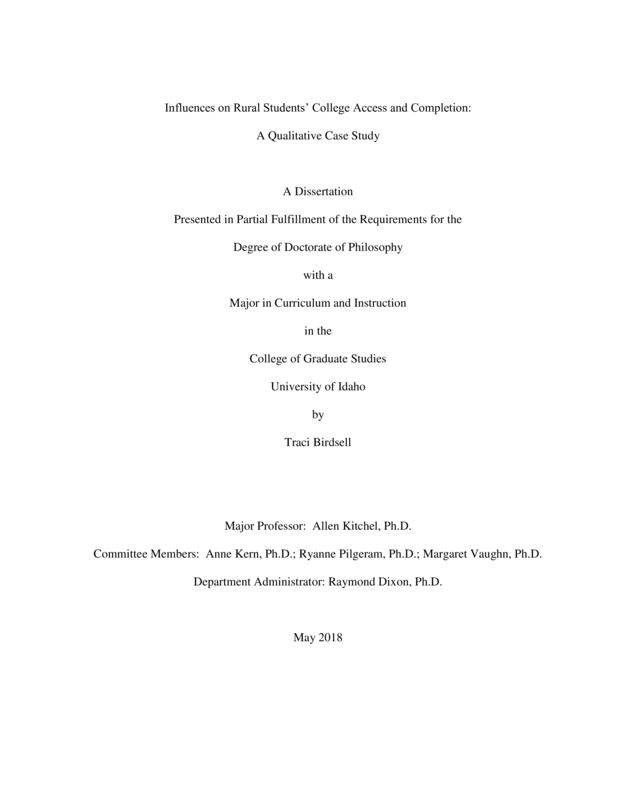Influences on Rural Students' College Access and Completion: A Qualitative Case Study
Birdsell, Traci Lynn. (2018-05). Influences on Rural Students' College Access and Completion: A Qualitative Case Study. Theses and Dissertations Collection, University of Idaho Library Digital Collections. https://www.lib.uidaho.edu/digital/etd/items/birdsell_idaho_0089e_11349.html
- Title:
- Influences on Rural Students' College Access and Completion: A Qualitative Case Study
- Author:
- Birdsell, Traci Lynn
- Date:
- 2018-05
- Keywords:
- college access college completion qualitative research rural students social capital theory theory of planned behavior
- Program:
- Curriculum & Instruction
- Subject Category:
- Education
- Abstract:
-
Historically underrepresented populations are racial/ethnic minorities, low socioeconomic status, first-generation college students, and students with disabilities. Rural area youth, while intersecting differing underrepresented characteristics, encounter experiences unique to college access and completion that low-income, first-generation, non-rural students do not face. This qualitative case study investigated the lives of ten high school graduates of Lincoln High School (pseudonym) between 2008 and 2011 who came from a rural community and examined their college access and completion experiences. The methods of data collecting include the use of a questionnaire and interview and was reviewed as was the data analysis techniques and efforts to synthesis data.
Concerning college, the emergent themes of finances, voice and community were examined through social and human capital (Coleman, 1988) and planned behavior theory (Ajzen, 1991) lenses. Participants cited finances as a major challenge. All participants talked of different influences on their decisions. While the voices that the participants first heard were from family, community members, or school personnel, over time and with experience, a stronger voice emerged from within, and this voice was the participants’ own, telling them that college was their choice, not someone else’s. Rural youth spoke of a strong sense of community.
What the research found supported others’ research on underrepresented populations as well as provided participant voices and added personal perspectives to mostly quantitative data. Rural youth can be situated with other defined underrepresented populations such as low-income and first-generation. However, rural youth are uniquely situated concerning the prospect of leaving their deep-rooted community connection to go away to college and possibly never return. For example, staying in Lincoln to live and work while at college was not an option as the nearest college was 75 miles away. This is in sharp contrast to urban students who can continue to live and work in their community while attending college.
The dissertation concludes with recommendations to rural students, families, communities, and policy makers. Recommendations offer practical suggestions both honoring and keeping rural identity while encouraging discussions of their challenges.
- Description:
- doctoral, Ph.D., Curriculum & Instruction -- University of Idaho - College of Graduate Studies, 2018-05
- Major Professor:
- Kitchel, Allen
- Committee:
- Vaughn, Margaret; Kern, Anne; Pilgeram, Ryanne
- Defense Date:
- 2018-05
- Identifier:
- Birdsell_idaho_0089E_11349
- Type:
- Text
- Format Original:
- Format:
- application/pdf
- Rights:
- In Copyright - Educational Use Permitted. For more information, please contact University of Idaho Library Special Collections and Archives Department at libspec@uidaho.edu.
- Standardized Rights:
- http://rightsstatements.org/vocab/InC-EDU/1.0/

